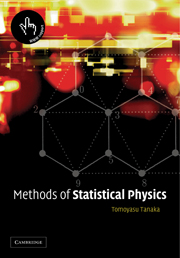Book contents
- Frontmatter
- Contents
- Preface
- Acknowledgements
- 1 The laws of thermodynamics
- 2 Thermodynamic relations
- 3 The ensemble theory
- 4 System Hamiltonians
- 5 The density matrix
- 6 The cluster variation method
- 7 Infinite-series representations of correlation functions
- 8 The extended mean-field approximation
- 9 The exact Ising lattice identities
- 10 Propagation of short range order
- 11 Phase transition of the two-dimensional Ising model
- Appendix 1 The gamma function
- Appendix 2 The critical exponent in the tetrahedron approximation
- Appendix 3 Programming organization of the cluster variation method
- Appendix 4 A unitary transformation applied to the Hubbard Hamiltonian
- Appendix 5 Exact Ising identities on the diamond lattice
- References
- Bibliography
- Index
3 - The ensemble theory
Published online by Cambridge University Press: 06 July 2010
- Frontmatter
- Contents
- Preface
- Acknowledgements
- 1 The laws of thermodynamics
- 2 Thermodynamic relations
- 3 The ensemble theory
- 4 System Hamiltonians
- 5 The density matrix
- 6 The cluster variation method
- 7 Infinite-series representations of correlation functions
- 8 The extended mean-field approximation
- 9 The exact Ising lattice identities
- 10 Propagation of short range order
- 11 Phase transition of the two-dimensional Ising model
- Appendix 1 The gamma function
- Appendix 2 The critical exponent in the tetrahedron approximation
- Appendix 3 Programming organization of the cluster variation method
- Appendix 4 A unitary transformation applied to the Hubbard Hamiltonian
- Appendix 5 Exact Ising identities on the diamond lattice
- References
- Bibliography
- Index
Summary
Microstate and macrostate
In the formulation of statistical mechanics we are concerned with the theoretical prediction of thermodynamic properties of a physical system which contains a large number of particles such as electrons, atoms, and molecules by some statistical average processes performed over an appropriately prepared statistical sample. There are many different ways to prepare the sample. J. Willard Gibbs (1901) coined the name ensemble for the statistical sample, and three different ensembles are introduced, i.e., the microcanonical, canonical, and grand canonical ensembles.
We can choose for the physical system any thermodynamical system such as a single-component gas, liquid, or solid, as well as a mixture of many components, as long as the system is in the condition of thermodynamical equilibrium. In order to establish a fundamental principle of statistical mechanics, however, we naturally choose as simple a system as possible, such as the one-component dilute gas made up of structureless monatomic molecules. We then extend the fomulation step by step to more complicated systems. In this chapter, formulation of the three Gibbs ensembles will be developed.
The microcanonical ensemble is a collection of identical replicas of a given physical system which is a gas made up of noninteracting structureless particles. Firstly, the system is assumed to be contained in a box of volume V, the number of particles is equal to N, and the total energy is given in a narrow range between E and E + dE.
- Type
- Chapter
- Information
- Methods of Statistical Physics , pp. 50 - 68Publisher: Cambridge University PressPrint publication year: 2002

